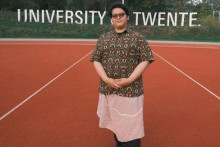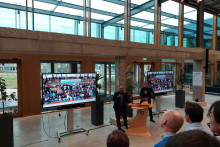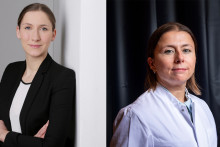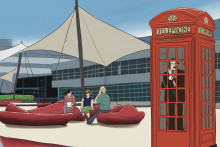Dzaki Hakim
Name: Dzaki Taufiiqul Hakim
Age: 21
Studying: Industrial Engineering & Management
Home University: University of Indonesia (Indonesia)
Dzaki Hakim, a 21-year-old Indonesian student, explains that he made a well-considered decision to come to the Netherlands for his exchange. He provides various reasons, with modern public transportation being one of them. Moreover, ‘it is really easy to speak English, and it is not as expensive as in other countries where English is the academic standard’. Hakim says that although the UT was not his first choice, it turned out to be a ‘blessing in disguise’. ‘I like entrepreneurship, and UT is very entrepreneurial, I’ve learned a lot in my minor to apply back in Indonesia.’
‘The UT feels like a blessing in disguise’
In the cultural differences between Indonesia and the Netherlands, one topic stands at the top of his list in particular: 'The Dutch are very direct, while Indonesians tend to beat around the bush. We use implicit communication to avoid hurting other people's feelings.’ Apart from this, Hakim faced other challenges like living on his own for the first time, or dealing with a different medical system. ‘I once called 112 after I felt pain in my throat, but they didn’t help me. It was hard for me to navigate in the medical system because it is very different from what I am used to.’
Stefhany Valenzuela
Name: Stefhany Valenzuela
Age: 21
Studying: Entrepreneurship and Business Development
Home University: Tecnológico de Monterrey (Mexico)
Like Hakim, Stefhany Valenzuela, a Mexican exchange student, had a prior experience with the Netherlands. ‘I’ve visited the country before and wanted to immerse myself further in its culture.’ Her decision to choose the UT was carefully considered. ‘The offered courses were attractive and I wanted to specialize more in innovation and found out that the UT is a very innovative university.’
Valenzuela says there are academic differences between the UT and what she is used to at Tecnológico de Monterrey. ‘The work pressure is lower, and the way of studying is more independent and theoretical. Back home, I was used to work on projects with companies where we apply our learned theory to cases.’ In her studies, she faced cultural differences as well. ‘People in my project group say what they are thinking, while I am used to sugarcoating all the feedback I provide. This encouraged me to be more straightforward in my way of communicating.’
‘My exchange forced me to come out of my shell’
The Mexican exchange student mentions the main takeaways from her semester abroad. ‘My exchange here forced me to come out of my shell and put myself out there. I started to appreciate my friends and family more. Besides, interacting with people from other cultures taught me to be more open.’
For Francisca Mineiro, an International Business Administration student from Portugal, the UT wás her first choice. ‘When I looked into the UT, it turned out to be very proactive, student-oriented, and it appeared to have a nature-oriented campus. Above all, I got the opportunity to study business with a focus on healthcare.’
Francisca Mineiro
Name: Francisca Mineiro
Age: 23
Studying: International Business Administration
Home University: University of Aveiro (Portugal)
The Portuguese came well-prepared by learning some Dutch and having a conversation with her mobility coordinator in Portugal. ‘I was warned upfront by my mobility coordinator about the Dutch direct way of speech, giving feedback, and the academically demanding environment.’
in Portugal. ‘I was warned upfront by my mobility coordinator about the Dutch direct way of speech, giving feedback, and the academically demanding environment.’
For Mineiro, the academic differences appeared to be significant. ‘At the UT, there is more focus on the student side of classes. You are expected to have an opinion and actively contribute to the lectures, which is different from what I am used to. Besides, work-life balance is better at the UT; students do not seem to work as much during the evening or weekends as we do in Portugal. Back home, studying at 1am in the library during exam weeks is not frowned upon.’
‘At the UT, you are expected to have an opinion’
Several factors turned out to be different than expected. ‘I learned Dutch before coming to the Netherlands, but after arriving everyone asked me why I tried to learn it. They told me that Dutch is a useless language. In Portugal, this would be unthinkable. Language is a national treasure for us, we see it as an integral part of our identity.’ The biggest challenge I faced? ‘Making Dutch friends. Connecting with Dutch people was harder than I thought.’







